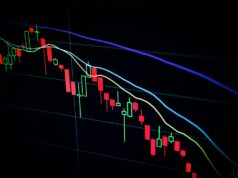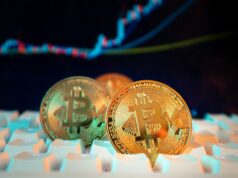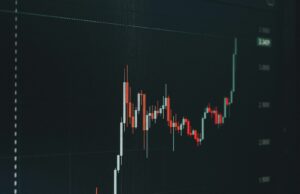In the unfolding narrative of financial evolution, we find ourselves at a pivotal juncture where the systems of exchange are undergoing a transformation as profound as any witnessed in the annals of trade. The emergence of decentralized exchanges marks not merely an alteration in the mechanism of trading but signifies the ascendance of a new philosophy–decentralization. Here, the peer-to-peer marketplaces breathe life into the very essence of autonomy, allowing traders to engage directly, unshackled from traditional intermediaries who have long held the reins of financial transactions.
As we delve deeper into this landscape, we observe an intricate tapestry woven with the threads of innovation and necessity. The evolution of decentralized finance (DeFi) trading platforms is not just a technological advancement; it is a response to a yearning for greater control and transparency in an often opaque financial world. These platforms embody the spirit of community and collaboration, offering a sanctuary where every participant can partake in the benefits that once seemed the exclusive domain of a privileged few.
The allure of decentralized exchanges lies in their promise–a promise of security, privacy, and empowerment. As traders navigate these new waters, they are met with systems that prioritize their agency, enabling them to forge their paths through the complexities of crypto trading. This shift represents more than just a change in how we buy or sell; it heralds a broader cultural movement toward embracing the values of decentralization and individual governance in every facet of our economic lives.
In this article, we shall explore the intricacies and implications of this rise–the dynamics that fuel these peer-to-peer marketplaces, the innovations shaping DeFi trading platforms, and the profound impact these developments hold for the future of global trading systems. Together, let us embark on this journey through the evolving landscape of decentralized exchanges, tracing its origins and contemplating its promising horizon.
The Rise of Decentralized Exchanges: A New Era in Crypto Trading
In the vast and often tumultuous landscape of cryptocurrency, the emergence of decentralized exchanges marks a significant evolution in trading paradigms. Unlike their centralized counterparts, these platforms embody the spirit of decentralization, allowing users to engage directly with one another in a peer-to-peer manner. This shift not only democratizes access to financial markets but also fosters an environment where trust is distributed across the network rather than concentrated in a single entity. The ascendance of these exchange systems reflects a profound change in how individuals interact with value and trade, echoing the age-old human desire for autonomy and self-governance.
The rise of DeFi trading platforms has catalyzed this transformation, offering innovative systems that empower users to retain control over their assets. These platforms harness smart contracts to facilitate transactions without the need for intermediaries, reducing the friction typically associated with traditional trading methods. As traders flock to decentralized marketplaces, they find themselves part of a broader movement that prioritizes transparency and security. This evolution is not merely technical; it represents a philosophical shift towards financial inclusivity and resilience against systemic failures that have plagued legacy systems.
Moreover, as the adoption of distributed exchange systems grows, so too does the sophistication of the underlying technologies. Liquidity pools, automated market makers, and yield farming have become integral components of these platforms, enhancing their appeal to traders seeking both efficiency and profit. This intricate dance of innovation showcases the remarkable adaptability of decentralized finance, revealing how quickly it can respond to market demands. The community-driven nature fosters collaboration and creativity, allowing for rapid iterations that traditional finance would struggle to match.
However, this ascendant tide is not without its challenges. The decentralized nature of these exchanges can lead to vulnerabilities that must be addressed through robust security measures and user education. As participants navigate these new waters, a collective responsibility emerges–to safeguard not only their interests but also those of their peers within these evolving marketplaces. This interconnectedness highlights the importance of shared knowledge and vigilance in cultivating a safe trading environment that honors the principles of decentralization.
In conclusion, the rise of decentralized exchanges heralds a new era in crypto trading, characterized by innovation, resilience, and community engagement. As we witness the ongoing evolution of peer-to-peer crypto marketplaces, it becomes evident that this movement is more than just a technological advancement; it is a testament to humanity’s enduring quest for freedom and equity in financial transactions. In embracing decentralization, we are not merely participating in a trend; we are shaping the future of global commerce itself–one transaction at a time.
Understanding Decentralized Exchanges: The Evolution of Peer-to-Peer Crypto Marketplaces
In the vast landscape of digital finance, the emergence of decentralized exchanges marks a pivotal moment in the evolution of peer-to-peer marketplaces. These platforms, built on the principles of decentralization, challenge the traditional narratives that have long dominated the trading systems of cryptocurrencies. Through their innovative structures, they empower individuals to connect directly, bypassing intermediaries and fostering a sense of community among traders. This shift not only democratizes access to financial resources but also instills a renewed sense of trust–an essential ingredient in any marketplace.
As we trace the ascendance of distributed exchange systems, it becomes evident that they represent more than just an alternative to centralized models; they embody a philosophy rooted in autonomy and transparency. In these environments, transactions occur directly between users, each participant wielding control over their assets without the looming shadow of a central authority. This fundamental change redefines our understanding of trading, where participants are no longer mere consumers but active stakeholders in the ecosystem. Such transformations reflect an evolving narrative in crypto, one that champions individual agency and collective responsibility.
The rise of DeFi trading platforms showcases this paradigm shift with remarkable clarity. These systems leverage smart contracts to facilitate seamless transactions while ensuring security and efficiency–a testament to the power of blockchain technology. As liquidity pools grow and governance tokens emerge, traders are not only equipped with tools for trading but also become part of a larger conversation about the future direction of finance itself. It is within these decentralized frameworks that we witness a profound restructuring of economic interactions, creating opportunities previously unimaginable.
In conclusion, as we navigate this new era characterized by decentralization and innovation, the role of decentralized exchanges becomes increasingly significant. They are not merely platforms for trading; they are reflections of a broader cultural shift toward inclusivity and empowerment in the financial realm. The evolution of these peer-to-peer marketplaces heralds a future where control is distributed among users, offering a glimpse into what it means to trade not just for profit, but for participation in a shared vision–a vision where every transaction is a testament to trust and collaboration.
The Rise of Decentralized Exchanges: A New Era in Crypto Trading
In the quiet corners of the digital landscape, the evolution of decentralized exchanges (DEXs) has begun to reshape the way we understand trading in the realm of cryptocurrencies. These platforms emerge not merely as alternatives but as beacons of a new philosophy–decentralization–that challenges the traditional notions of financial intermediaries. The beauty of this shift lies in its ability to empower individuals, allowing them to engage in peer-to-peer transactions without the shackles of centralized authority. Each trade becomes a testament to autonomy, a celebration of individual choice in a world that often seeks to dictate terms.
The rise of these marketplaces marks an ascendance that is both gradual and profound. As users flock to DEXs, they find themselves part of a larger movement towards systems that emphasize transparency and security. Unlike their centralized counterparts, where trust is placed in a single entity, decentralized exchanges distribute that trust among all participants. This fundamental shift fosters an environment where users can trade freely, guided by smart contracts that execute with impartiality and precision. In this new paradigm, the very act of trading transforms into a collaborative effort, supported by technology rather than bound by bureaucracy.
At the heart of this transformation lies the emergence of DeFi trading platforms, which offer innovative solutions to age-old problems. In a world where access to financial services has often been limited by geography or socioeconomic status, DeFi provides a lifeline to those who have been historically marginalized. These platforms stand as testaments to the power of inclusivity, inviting anyone with an internet connection to partake in global markets. The decentralization inherent in these systems ensures that no single entity can monopolize opportunities; instead, wealth and resources can flow more freely among participants.
As we delve deeper into the mechanics of these distributed exchange systems, it becomes clear that they are built upon principles designed for resilience and accessibility. The architecture of DEXs allows for seamless integration with various blockchain technologies, enabling a diverse range of assets to be traded without friction. Users can navigate these digital marketplaces with ease, confident that their transactions are protected by cryptographic security measures. This newfound freedom not only enhances user experience but also cultivates trust–a vital ingredient in any trading ecosystem.
Moreover, the advantages of using DEXs extend beyond mere convenience; they encompass a broader vision for the future of finance. By eliminating intermediaries, traders benefit from reduced fees and faster transaction times, creating an environment where profits can be maximized and risks minimized. This efficiency is particularly appealing in volatile markets where every second counts and every percentage point matters. In this context, decentralized exchanges represent not just a trend but an evolution–a natural progression towards a more equitable financial landscape.
As we stand on the precipice of this new era in crypto trading, it is essential to acknowledge the transformative potential held within these decentralized platforms. They embody a shift towards empowerment, transparency, and inclusivity–values that resonate deeply within the ethos of the cryptocurrency community. The journey towards full decentralization may be fraught with challenges, yet it is one marked by hope and innovation. With each transaction executed on these DEXs, we participate in something greater: a collective endeavor to redefine how we exchange value and engage with one another in this interconnected world.
The Rise of Decentralized Exchanges: A New Era in Crypto Trading
In the vast expanse of the digital landscape, a quiet revolution has taken hold, driven by the principles of decentralization. The emergence of decentralized exchanges (DEXs) marks a pivotal moment in the evolution of peer-to-peer marketplaces. Where once there were centralized systems, heavy with the weight of bureaucracy and control, a new era is dawning. It is one where traders can engage directly with one another, liberated from the shackles of intermediaries. Yet, as with all great movements, this ascendance brings its own set of challenges that must be navigated with care and foresight.
The heart of this transformation lies in the innovative platforms that have sprung forth from the depths of blockchain technology. These distributed systems offer a promise of transparency and security, inviting participants to partake in trading activities without fear of manipulation or undue influence. However, this promise is tempered by the realities of user experience and accessibility. Many potential traders find themselves bewildered by the complexity often associated with DeFi platforms. The user interface can be daunting, and the intricacies of smart contracts may deter even the most determined participants. Thus, while the foundation is strong, the path to widespread adoption requires attention to these hurdles.
Moreover, security remains an ever-present concern in the decentralized realm. As the tide of innovation rises, so too does the risk of malicious actors seeking to exploit vulnerabilities within these emerging systems. The lessons learned from past breaches serve as stark reminders that while decentralization offers freedom, it also demands vigilance. Traders must educate themselves on safe practices and remain wary of potential pitfalls lurking within seemingly trustworthy platforms. This duality embodies the spirit of progress–advancing towards a brighter future while acknowledging the shadows cast by past mistakes.
As we observe this evolution, it becomes clear that decentralized trading is not merely a technical advancement; it represents a philosophical shift in how we view commerce itself. The traditional notion of exchange, where power resides in a few centralized entities, is being dismantled piece by piece. Instead, we are witnessing the rise of community-driven marketplaces where individuals wield greater control over their assets. This shift fosters a sense of belonging and participation that transcends geographical boundaries–an essential characteristic of our interconnected world.
Yet, for all its promise, the decentralized landscape remains fraught with uncertainty. Regulatory frameworks are still grappling with how to approach these distributed systems, leading to an atmosphere thick with ambiguity. Traders find themselves navigating not only market fluctuations but also an evolving legal landscape that could reshape their interactions within these marketplaces. In this dynamic environment, adaptability becomes paramount; success hinges on one’s ability to respond to both market trends and regulatory changes.
In conclusion, as we stand at the precipice of this new era in crypto trading, it is essential to recognize both the opportunities and challenges that lie ahead. The emergence of DeFi trading platforms heralds a future rich with potential yet fraught with complexities that demand our attention and understanding. As we embrace this evolution toward decentralized exchanges, let us do so with an appreciation for the intricacies involved–fostering a spirit of collaboration and learning among all participants in this brave new world.














